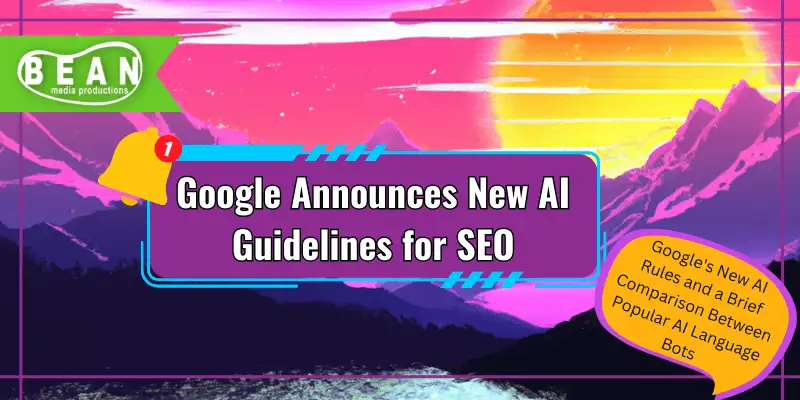Hello and welcome back to the blog here at Bean Media, where we like to give you little sneak peeks beanhind the scenes of our slice of the internet and digital marketing as a whole. With the recent introduction of AI content chatbots and how public they’ve gotten, Google has refocused its stance on automated content.
Google’s Shifting AI Content Stance
Previously, using automated content on Google was a recipe for getting nuked on your rankings almost instantaneously. However, with tools like ChatGPT, Bing, and Google’s own Bard, that stance has had to shift. Some bad actors may use these tools to try and game the search engine, but by and large, they get caught. For most people, Google doesn’t necessarily care whether a human or a robot wrote something.
HOWEVER, that comes with a major caveat. The content still needs to display the values of E-E-A-T that we talked about a couple of months back. Your content still needs to be of high quality and user-focused. Companies like Google knew people would use AI for content once it became widely available, and telling people full-stop to not use it wouldn’t work. Instead, Google and Microsoft are trying to position themselves as responsible AI content creators.
Avoid Low-Effort, Spammy Posts, Regardless of the Author
Google’s new stance on AI content reflects that. The search giant – and other search engines – realize that humans can write content that’s just as low-effort and spammy as a bot can. AI tools like ChatGPT, Bing, Bard, etc, are to be used like a calculator in math – to reduce monotony and tedious tasks. Regardless of how your content is produced, if it’s spammy and lacking quality, you’ll be punished for it.
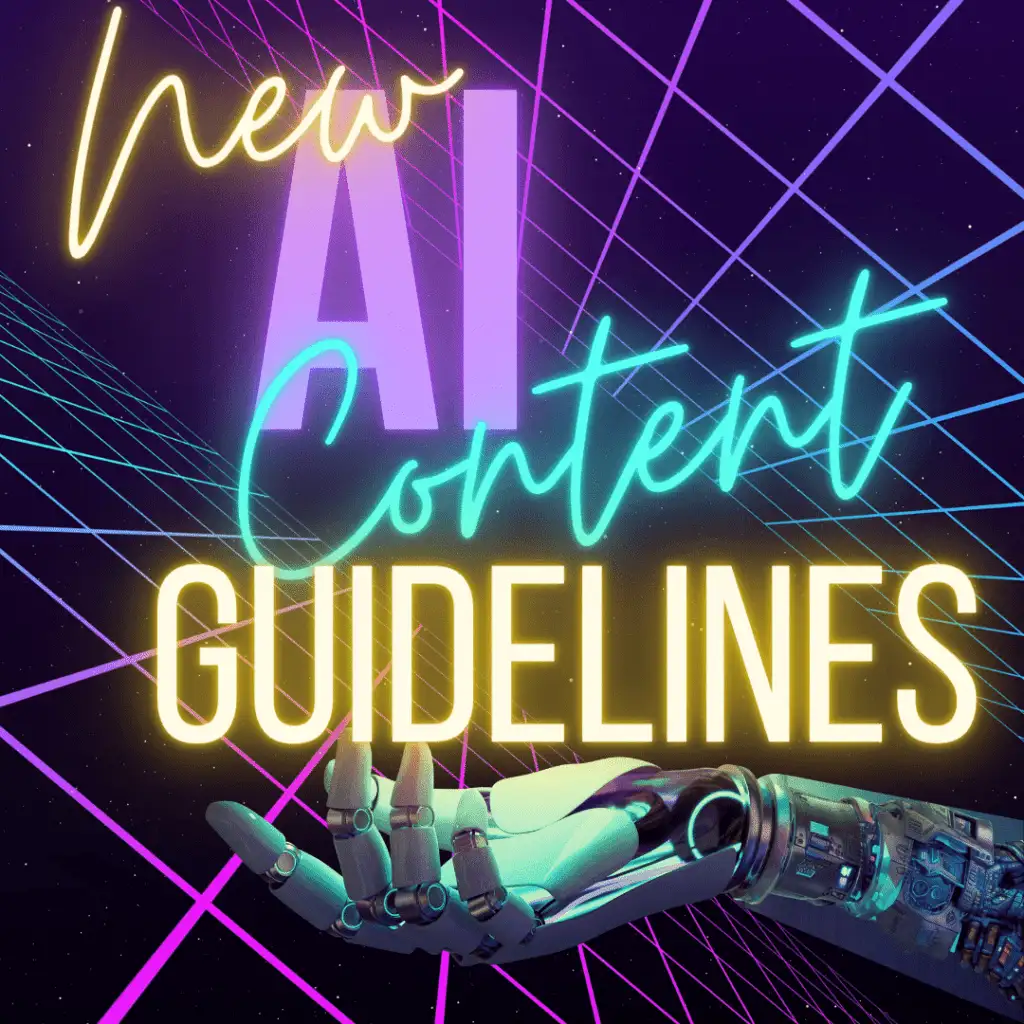
And Google has gotten very good at recognizing quality content – remember Panda, and links? Not to mention the recent Helpful Content Update. Spammy content will see your rankings tank, and getting them back up can be difficult, in many cases taking months.
Using AI Content Responsibly
If you’re using AI as one part of a toolset to produce valuable and unique content, Google won’t ding you and it won’t necessarily matter who wrote it – human or robot. Google is not, however, giving people the green light to enter a simple prompt into ChatGPT, copy the text it spits out, and paste it into your website. That’s essentially aggregating content, and it’s something Google will have no issue heavily punishing your website for as others have been in the past. AI Chatbots are like any tool – one you should leverage to create the best content you can.
AI Content Disclosures
That brings us to AI disclosures. Google doesn’t give a hard stance either way on the topic, instead stating that you could “consider” adding a disclaimer with “AI or automation disclosures are useful for content where someone might think ‘How was this created?’. Consider adding these when it would be reasonably expected.”
Quality Content Matters
The rise of AI content and the temptation to use it as a cheap way to try and write for Google’s crawlers is why you need an experienced digital marketing team on your side to cut through the nose and write unique, person-focused content. Having that high-quality content will rise above the low-effort posts and drive more traffic to your website, which should lead to more sales. AI is useful for being a base for your content, but you need to add to it.
The means of playing the game evolve with technology, but the ultimate goal – getting users the best result they can – remains the same.
Testing AI Content Chatbots
That all brings us to the burning question you probably have now – which of these AI tools is the best? The answer is it depends. ChatGPT uses something analogous to GPT-3.5, where it’s built on the GPT-3 framework and customized from there (GPT-4 is also available in the paid tier), Bing uses GPT-4, and Bard … Well it exists. ChatCPT recently announced they’re testing plugins for a subset of paid users to bring it closer to Bing’s ability to create images, search the internet, and provide sources.
We don’t currently have access to Bard (currently it’s under a limited, invite-only preview), so we’ll test using ChatGPT’s free tool and Microsoft’s Bing Chat. Lets see how each of these answers various kinds of questions.
“How Do I Beat Riven in Last Wish?”

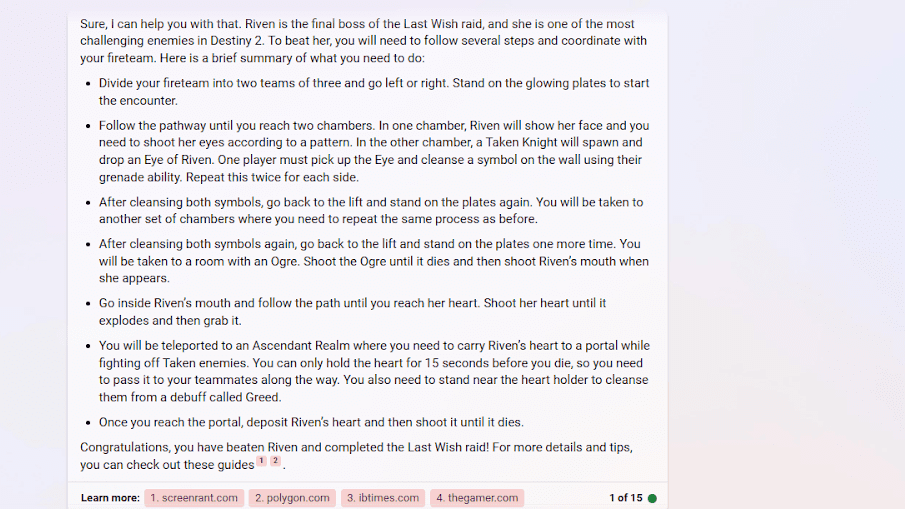

As you can see, ChatGPT gives us an answer, but that answer can be applicable to any number of multiplayer boss encounters – stay alive, use the right gear, and communicate. It doesn’t give any substance. BingChat gives us two tiers of answers (there’s also a 3rd in between, but its answer was similar to ChatGPTs).
The first tier, creative, gives us what we’re looking for – mechanics and specifics, even pointing players to where to go and what to do, how the wipe mechanic works, etc. The other tier, precise, then gives us recommendations on what to actually bring with us, and the meat and potatoes of all mechanics, along with sources for that information and recommended questions in the same topic. Ultimately, BingChat Precise gave us the best answer and allowed us to ask the best follow-ups.
“This is just silly video game stuff”, you might be thinking. And that’s true, however in broad strokes what we’re learning from this ultimately inconsequential query can be applied to more topics.
“How Do I Bake Brownies?”
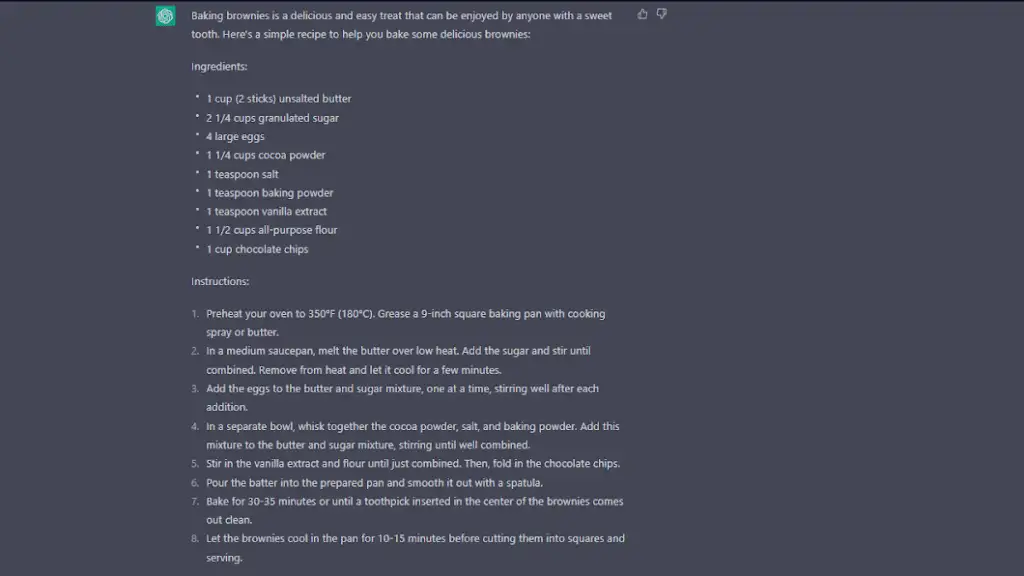


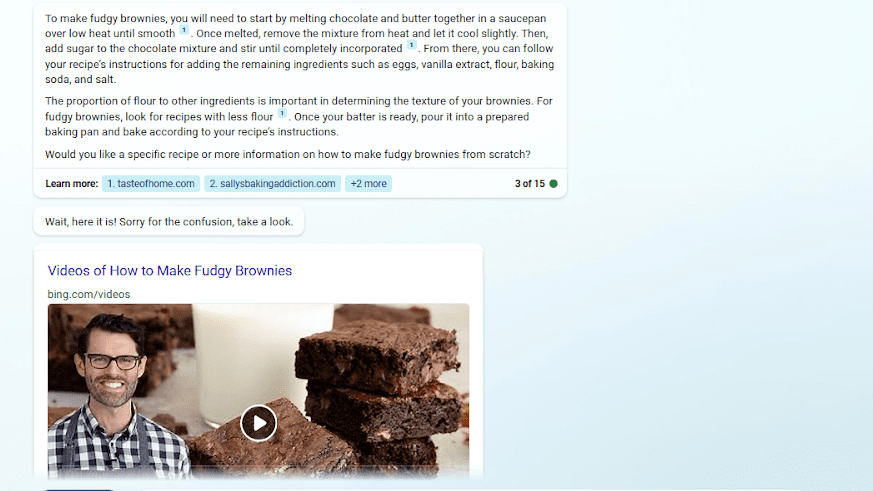
Using brownies as our next example, we can see how these AI handle baking. ChatGPT assumes that you want fudgy brownies (personally, I do) and gives a pretty simple recipe for homemade brownies (note: I do not bake and am not entirely sure how well this recipe will actually work).
BingChat Creative doesn’t give us much, really just the framework of what to do, without a specific recipe. Bing Precise, again, is a little underwhelming in its initial answer but comes up strong on the follow-up. Initially giving us a similar not-recipe that Creative gave us, but it then had a follow-up prompt asking if we wanted to bake cakey or fudgy brownies, told us how to get them fudgier, and a video with a recipe to follow along with.
Wrapping Up
AI tools like these are still very new and going through some growing pains. And comparing bots like ChatGPT on the GPT-3 framework vs Bing’s GPT-4 almost feels unfair with how much more is packed in. At the moment, based on what’s freely available to the public, BingChat is the clear winner. As we spend more time with these tools and they grow and evolve, we’ll see which ones leap ahead, and stay ahead, of the pack. Remember, these are ultimately tools (much like Dall-E!) that are useful to enhance what humans can do, not replace us entirely.
Remember that unique, human-driven content written to be informative and add value will rise to the top. Content that’s low-effort and spammy, simply scraping the web for what others have already said, will be detected and hit by search engines like Google.
Connect with the World!
Bean Media Productions is a full-service digital marketing firm located in Buffalo, NY! But don’t let that fool you, we have clients all over! Our digital marketing agency gives each of our clients the individual attention and service they deserve. We have a proven track record of success in growing business with search and digital advertising (and PPC!), SEO, graphic design, content marketing, conversion rate optimization (CRO), video production and editing, and so much more.
Be Seen online. Be Heard by your prospective customers. Grow With Us here at Bean Media!
Stay up to date with our blog, you’ll regularly get some free basic internet marketing advice, updates on what’s what in our little corner of the world, and more! You can also check out our Facebook, YouTube and Instagram pages for a more detailed picture of who we are and what we do.
Are you ready to launch your digital presence into the stratosphere? Give us a call or fill out our online contact form today. We can’t wait to grow your business!


